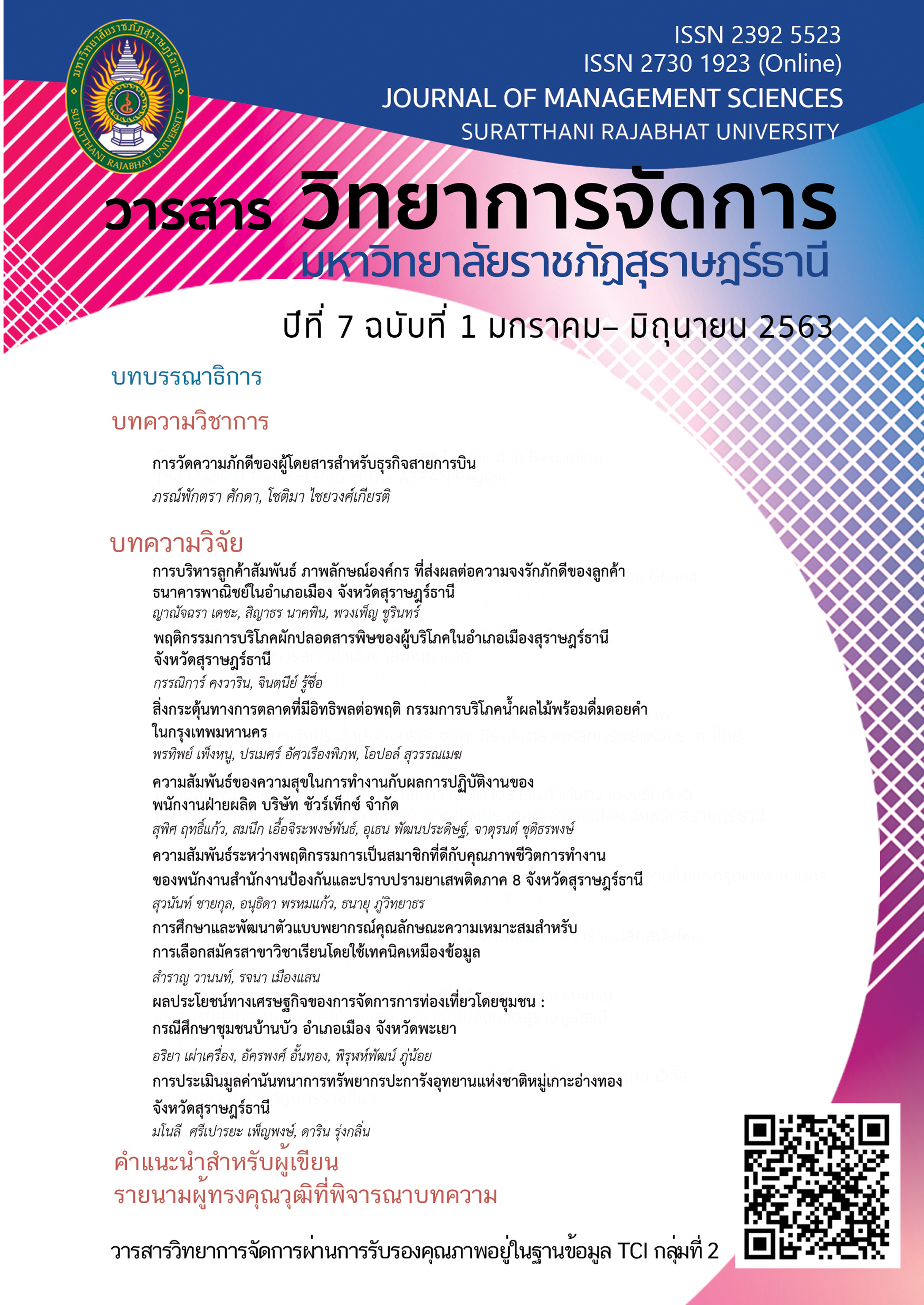Economic Benefits of Community-Based Tourism’s Management: A Case Study of Ban Bua, Muang District Phayao
Main Article Content
Abstract
This article aimed to evaluate the economic benefits of community-based tourism management by applying qualitative research guidelines to collect and check the reliability and accuracy of data obtained from the in-depth interviews with community leaders and stakeholders in activities related to community-based tourism of Ban Bua community in Phayao Province. The results found that community-based tourism is managed by decentralized management through the Learning Center. A committee to set service fees and the allocation of occurring benefits. The benefits were divided through three sectors. The result from the economic benefit estimation showed that the activities related to community-based tourism earn about 1.5 million baht per year. The activity which created the highest return was the food group while the homestay received the net present value of 0.77-1.87 hundred thousand Baht . The return that each activity owner receives consisted of gross profit and wage, which account for more than 60 percent of total revenue . The revenues as mentioned were direct effects that do not include the indirect effects resulting from multipliers of visitor expense. The significant suggestions from this study were relevant agencies should provide priority to the distribution of benefits and encourage activities that have low investment and mainly use household labor. These findings were important information for other communities interested in tourism development, to be used in planning for the community to earn worthwhile returns and develop sustainable community-based tourism.
Article Details
References
กาญจนา สุระ. (2556). การพัฒนาศักยภาพการบริหารจัดการ การท่องเที่ยวโดยชุมชน จังหวัดเชียงใหม่ ภายใต้ความร่วมมือทางวิชาการของมหาวิทยาลัยราชภัฏเชียงใหม่กับท้องถิ่น จังหวัดเชียงใหม่ ปีที่ 2. เชียงใหม่: มหาวิทยาลัยรราชภัฏเชียงใหม่.
คมสัน วาฤทธิ์. (2545). ศักยภาพของชุมชนท้องถิ่นในการส่งเสริมการท่องเที่ยวเชิงนิเวศ: กรณีศึกษาชุมชนลำน้ำว้าอำเภอแม่จริม จังหวัดน่าน. (วิทยานิพนธ์ศิลปศาสตรมหาบัณฑิต). เชียงใหม่: มหาวิทยาลัยเชียงใหม่.
จันทนา จันทโร และศิริจันทร์ ทองประเสริฐ. (2545). การศึกษาความเป็นไปได้ของโครงการด้านธุรกิจและอุตสาหกรรม. กรุงเทพฯ : โรงพิมพ์แห่งจุฬาลงกรณ์มหาวิทยาลัย.
ณัฏฐพัชร มณีโรจน์. (2560). การจัดการการท่องเที่ยวโดยชุมชน. วารสารวิชาการการท่องเที่ยวไทยนานาชาติ, 13 (2),25-46.
นิรันดร์ บุญเนตร. (2547). ศักยภาพการจัดการการท่องเที่ยวเชิงนิเวศ บ้านแม่กำปอง จังหวัดเชียงใหม่. (วิทยานิพนธ์ศิลปศาสตรมหาบัณฑิต). เชียงใหม่: มหาวิทยาลัยเชียงใหม่.
ประกอบศิริ ภักดีพินิจ. (2556). การพัฒนาการท่องเที่ยวและเรียนรู้บนพื้นฐานการจัดการมรดกทางวัฒนธรรมของชุมชนเศรษฐกิจพอเพียงบ้านดอกบัว จังหวัดพะเยา. วารสารมนุษย์ศาสตร์และสังคมศาสตร์, 1 (1), 67-79.
ประสิทธิ์ ตงยิ่งศิริ. (2544). การวางแผนและการวิเคราะห์โครงการ. กรุงเทพฯ : ซีเอ็ดยูเคชั่น.
มธุรส ปราบไพรี. (2543). ศักยภาพของชุมชนในการจัดการแหล่งท่องเที่ยว: กรณีชุมชนไทยทรงดำ บ้านเขาย้อย ตำบลเขาย้อย อำเภอเขาย้อย จังหวัดเพชรบุรี. (การค้นคว้าอิสระศิลปะศาสตรมหาบัณฑิต). เชียงใหม่: มหาวิทยาลัยเชียงใหม่.
มิ่งสรรพ์ ขาวสอาด (2548). การพัฒนาการท่องเที่ยวเชิงบูรณาการที่ยั่งยืนในลุ่มแม่น้ำโขง. เชียงใหม่ : สถาบันวิจัยสังคม มหาวิทยาลัยเชียงใหม่.
มิ่งสรรพ์ ขาวสอาด และอัครพงศ์ อั้นทอง. (2557). โครงการปริทัศน์สถานภาพของความรู้เรื่องเศรษฐกิจท่องเที่ยวของประเทศไทย. เชียงใหม่ : สถาบันศึกษานโยบายสาธารณะ.
ยุทธภูมิ นามวงศ์. (2559). บ้านบัว: หมู่บ้านท่องเที่ยวเศรษฐกิจพอเพียง. ค้นเมื่อ 5 พฤษภาคม 2560, จาก https://www.facebook.com/media/set/?set=a.1220712054639953.1073744363.100001035109429&type=3
เยาวเรศ ทับพันธุ์. (2543). การประเมินโครงการตามแนวทางเศรษฐศาสตร์. กรุงเทพฯ : สำนักพิมพ์มหาวิทยาลัยธรรมศาสตร์.
วีระพล สุวรรณนันต์. (2524). ความรู้เบื้องต้นในการจัดเตรียมแผนและโครงการ ตอน การวิเคราะห์ความเป็นไปได้ของแผนและโครงการ (Feasibility study). กรุงเทพฯ : สำนักฝึกอบรม สถาบันบัณฑิตพัฒนบริหารศาสตร์.
สถาบันการท่องเที่ยวโดยชุมชน. (2554). CBT มีมิติ พื้นที่ทางสังคมของชุมชนในการกำหนดทิศทางการท่องเที่ยวสร้างการเรียนรู้ระหว่างเจ้าของบ้านกับผู้มาเยือน. สํานักงานกองทุนสนับสนุนการวิจัย (สกว.).
สมถวิล ช่างอาวุธ. (2543). การวิเคราะห์ทางเศรษฐกิจของโครงการพัฒนาการผลิตยางแผ่น: กรณีศึกษาสหกรณ์กองทุนสวนยางบ่อน้ำส้มจำกัด จังหวัดสงขลา. (วิทยานิพนธ์วิทยาศาสตรมหาบัณฑิต). กรุงเทพฯ : มหาวิทยาลัยเกษตรศาสตร์.
อัครพงศ์ อั้นทอง. (2552). ความเป็นฤดูกาลของการท่องเที่ยวในจังหวัดเชียงใหม่. วารสารเศรษฐศาสตร์ มหาวิทยาลัยเกษตรศาสตร์, 16 (2), 32-47.
อัครพงศ์ อั้นทอง. (2555). เศรษฐมิติว่าด้วยการท่องเที่ยว. เชียงใหม่ : สถาบันศึกษานโยบายสาธารณะ.
อัครพงศ์ อั้นทอง, กันต์สินี กันทะวงศ์วาร และณัฐพล อนันต์ธนสาร. (2561). การรับรู้ของประชาชนต่อผลกระทบจากการพัฒนาการท่องเที่ยวในท้องถิ่น. เชียงใหม่ : มูลนิธิสถาบันศึกษานโยบายสาธารณะ.
Chiappa, G. D., Atzeni, M., & Ghasemi, V. (2018). Community-based collaborative tourism planning in islands: a cluster analysis in the context of Costa Smeralda. Journal of Destination Marketing & Management, 8 (June), 41-48.
Kim, K., Uysal, M., & Sirgy, M. J. (2013). How does tourism in a community impact the quality of life of community residents? Tourism Management, 36 (June), 527-540.
Okazaki, E. (2008). A community-based tourism model: Its conception and use. Journal of sustainable Tourism, 16 (5), 511-529.
The ASEAN Secretariat. (2016). ASEAN Community Based Tourism Standard. Jakarta: ASEAN.
Tolkach, D., & King, B. (2015). Strengthening community-based tourism in a new resource-based Island nation: Why and how? Tourism Management, 48 (June), 386-398.
Untong, A., Phuangsaichai, S., Taweelerkunthon, N., & Tejawaree, J. (2006). Income distribution and community-based tourism: three case studies in Thailand. Journal of GMS Development Studies, 3(1), 69-82.
UNWTO. (2019). World Tourism Barometer. Madrid : World Tourism Organization.
World Tourism Organization. (1997). International Tourism: A Global Perspective. Madrid : World Tourism Organization.


